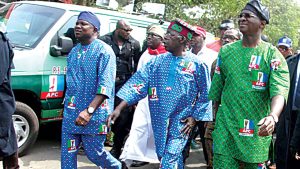
Governor Babajide Sanwo-Olu of Lagos State has signed a new law that mandates agencies like the EFCC, the ICPC, and other anti-graft agencies to hand over corruption cases to the state government.
According to the legislation titled ‘Lagos State Public Complaints and Anti-Corruption Commission Law’ signed by Sanwo-Olu last week, a copy of which was obtained by The Punch on Saturday, a new anti-corruption agency will have the exclusive rights to investigate financial crimes and corruption cases involving the finances of the Lagos State Government.
Section 13(3) of the law reads, “The commission shall upon the commencement of this law take over the investigation of all anti-corruption and financial crime cases involving the finances and assets of Lagos State Government being investigated by any other agency.”
Section 13(5) also states, “The commission shall have the power to the exclusion of any other agency or body to investigate and coordinate the investigation of corruption and financial crimes cases involving the finances and assets of the state government.”
Currently, three former Lagos governors, Bola Tinubu, Babatunde Fashola and Akinwunmi Ambode, are said to be under investigation by the EFCC. The anti-graft agency is also investigating the Speaker of the Lagos State House of Assembly, Mudashiru Obasa, who helped facilitate the passage of the law.
The new law, which will ensure the creation of a Lagos State anti-corruption agency, mandates all other agencies investigating the finances of the state to hand over the case to the state government.
According to the law, the commission shall have the power to investigate any person or administrative action taken by any ministry, department, agency or parastatal of the state government or any local government.
The new anti-graft agency shall investigate any offence under the criminal law of the state in relation to corruption and financial crimes, abuse of office, offences relating to the administration of justice, obtaining by false pretenses, cybercrime, fake news, interception of emails and fraudulent dealing with property debtors.
The law, which empowers the agency to investigate anyone who cannot explain his or her source of income, states that the anti-graft agency shall not be subjected to the direction and control of any authority.
The commission is, however, barred from investigating cases that are pending before the Lagos State House of Assembly, the Lagos State Executive Council or any court of law.
Corruption cases involving members of the Nigeria Police Force and the Armed Forces cannot be investigated by the commission, except acts of corruption committed by them as private individuals.
Mike Ozekhome (SAN) told The Punch that “the Lagos State law is valid,” adding that the constitution gives states the right to make such laws.
The senior advocate said corruption and crime are not on the exclusive legislative list and as such, the Lagos House of Assembly has more powers to create such law for the benefit of the state than the National Assembly, which created the EFCC and the ICPC.
Ozekhome argued that since the House of Assembly was in charge of making laws regarding taxation, charges and finances of Lagos State, the Assembly also has superior powers regarding diversion of such funds


